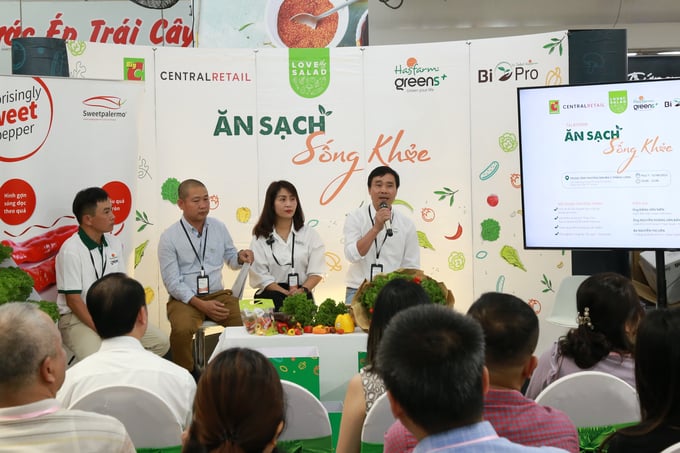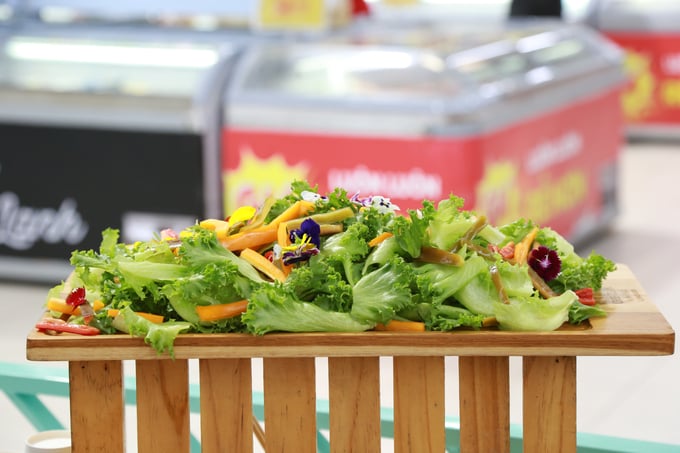November 25, 2025 | 23:48 GMT +7
November 25, 2025 | 23:48 GMT +7
Hotline: 0913.378.918
November 25, 2025 | 23:48 GMT +7
Hotline: 0913.378.918

Speakers at the seminar "Eat clean, live healthy". Photo: Lam Hung.
On August 12, Hasfarm Greens Company and Bio Pro - Dalat Hasfarm cooperated with Rijk Zwaan Vietnam LLC to organize a seminar with the theme "Eat clean, live healthy" at Big C Thang Long (Hanoi). Through the seminar, consumers are introduced to safe and healthy vegetable products and at the same time learn about how to use pest’s natural enemies to protect crops effectively.
Presenting hydroponically grown lettuce products, Dang Van Nien, Managing Director of Rijk Zwaan Vietnam said, “Hydroponics is a method of ‘growing plants in water’, or ‘growing plants without soil’. With this production method, nutrients will be provided by circulating water through the trough system. This water source is controlled in terms of nutrition and microbiology to ensure that plants have enough nutrients to grow and are safe to consume”.
This method will be able to limit the risk of microbiological contamination because the system uses soluble fertilizers instead of green manure and cattle manure. The water used for the hydroponic system is also filtered and treated clean before entering the system.

Hydroponic lettuce products are often processed into salads. When eaten, they have a sweet taste and crispy texture. Photo: Lam Hung.
Hydroponic farming does not require treating the cropland with chemicals and pesticides, minimizing the possibility of infection from pests and diseases from the outside environment or the risk of nitrate residue in the product.
Compared to conventional production methods, nitrate may remain in the soil, and producers who do not perform soil testing after each crop will not be aware of this residue. But when it comes to hydroponics, it is possible to calculate and control the optimal amount of nutrients for the plant.
Regarding the method of using natural enemies to support farmers in production, speakers at the seminar said that most farmers knew about the harmful effects of pesticides but had no alternative because there was no procedure for the use of natural enemies on crops.
“Currently, the habit of using pesticides in agriculture is gradually being changed to using biological products and natural enemies. Orchards using natural enemies can reduce a large amount of pesticides, thereby reducing the risk of residues of chemicals on vegetables and fruits, providing customers with safe and uniform products while helping to protect the environment”.
Translated by Samuel Pham

(VAN) Deputy Minister Nguyen Quoc Tri emphasized the determination to prevent violations at CoP20, sharing enforcement results and commitments to strengthen cooperation with the international community in the coming period.

(VAN) In addition to strengthening the relationship between schools and enterprises, the Aus4Skills project expands opportunities for female students and people with disabilities to work in the transport and logistics sector.

(VAN) Nghe An is preparing policy, technical, and resource steps to participate in the forest carbon credit market.
/2025/11/25/1648-2-110733_532.jpg)
(VAN) From 2011 to 2023, Ca Mau province lost approximately 6,200 ha of coastal land and protection forests due to erosion, threatening many residential areas, infrastructure facilities, and production zones.

(VAN) Quang Ngai holds strong potential for carbon credits but needs a clear legal and policy framework to secure sustainable revenue from this resource.

(VAN) With its diverse ecosystem, Phu Quoc National Park plays a vital role in environmental protection and biodiversity conservation and serves as the core zone of the Kien Giang World Biosphere Reserve.

(VAN) Cooperation activities under the Aus4Skills program focus on: logistics professional development, competency-based training and assessment (CBTA), leadership innovation, and digitalization.